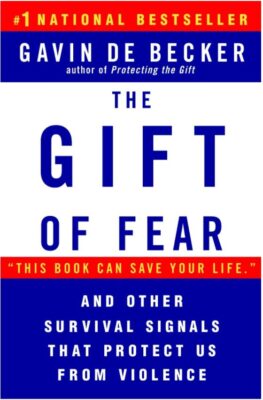So, as I mentioned in my last post, I was a bit rattled after my sketchy cab incident and decided to *FINALLY* pick up this book, The Gift of Fear, after 5 years of it sitting on my shelf. Â Surprisingly, it was not only insightful, but also read like a thriller. Â Not kidding, I couldn’t put the thing down – and not because I was scared either, but because the information was so rich and I saw how many of the common traps I’ve fallen into before.
I say before because I feel like this is something I’ve really worked on since joining the foreign service. Â It’s not like violence didn’t exist in my pre-foreign service life in Minnesota; it’s just that I thought I could “worry it away”. Â I could make up the most elaborate stories of what might happen to me and was ever-so-vigilant as a result (my family didn’t call me Safe Sarah for nothing). Â You see, I assumed that if I was on high alert all the time that safety would constantly be on my mind and therefore keep me out of danger.
Guess what? Â It’s exactly the opposite. Â De Becker states, “.. if one feels fear of all people all the time, there is no signal reserved for the times when it’s really needed. Â […] Â I strongly recommend caution and precaution, but many people believe — and we are even taught — that we must be extra alert to be safe. Â In fact, this usually decreases the likelihood of perceiving hazards and thus reduces safety. Â […] Â If we are looking for some specific, expected danger, we are less likely to see the unexpected danger.”
De Becker believes that worry is essentially useless AND a conscious choice we make because we get a secondary reward from it (avoiding change, not admitting powerlessness, etc). Â He says, “Worry is the fear we manufacture – it is not authentic. Â […] Â Many people believe that worrying about something will stop it from happening. Â Most of what people worry about has a low probability of occurring because we tend to take action about those things we feel are likely to occur. Â This means that very often the mere fact that you are worrying about something is a predictor that it isn’t likely to happen.”
Here are De Becker’s 3 simple rules regarding worry and fear:
- When you feel fear, listen.
- When you don’t feel fear, don’t manufacture it.
- If you find yourself creating worry, explore and discover why.
Given where I started, I’m quite proud of how far I’ve come in regards to safety. Â Joining the foreign service forced me to confront violence as a reality (it was easier to believe bad things didn’t happen in the US) and as a result I learned to accept that danger is real, but not something I needed to focus all my energy worrying about.
For me, safety now incorporates 3 things:
- Educating myself on possible threats in my environment (for example, knowing that kidnapping has happened to Expats in Lima before)
- Gathering information so that I can be as situationally aware as possible. Â If I know what the norm looks like, I’m more likely to intuitively recognize when something feels ‘off’, like it did my my cab situation.
- Always listening to and trusting my intuition, no matter what. Â If something doesn’t feel right, I don’t try to think it through anymore – I simply get out of there.
I hope this was informative and I highly, HIGHLY recommend that you pick up The Gift of Fear.




I LOVE this book. Thanks for sharing some very helpful information Sarah. You are the best!
Me too Mary – glad you found it useful! :)